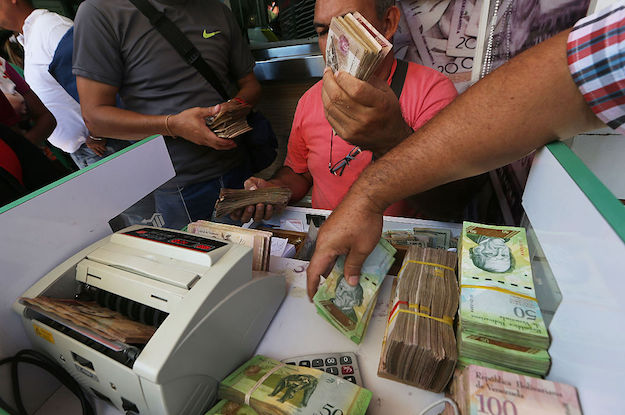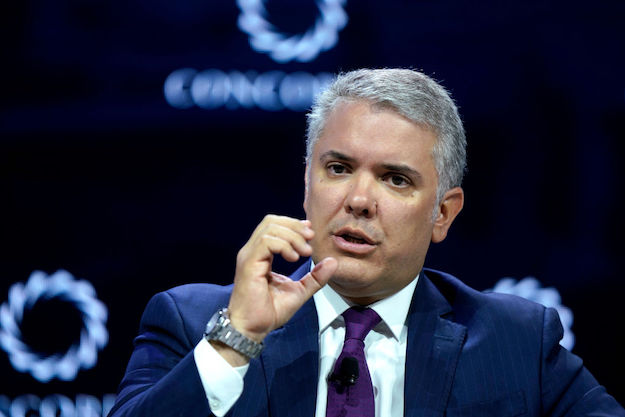Venezuela’s economy is undergoing the largest contraction in recorded Latin American history. Between 2012 and 2017, per capita GDP fell by a massive 38 percent, 10 points more than the United States during the Great Depression. The government has stopped publishing inflation data, but private sector estimates put it at nearly 3,000 percent in 2017 and predict it will accelerate into five digits this year. Real salaries have been pulverized in the process: A minimum wage salary today buys 10 percent of what it bought in March 2013, when Nicolás Maduro assumed the presidency.
There are many causes for Venezuela’s economic collapse, but certainly a prominent one has been massive budget deficits. Venezuela has been running double-digit deficits at the level of the consolidated public sector for six consecutive years; last year, the deficit reached a whopping 21 percent of GDP. The reason for this is that Venezuela’s government has chosen to maintain absurd and inefficient subsidies for goods provided to consumers by the state and to finance most of its spending by printing money. A gallon of gasoline, for example, is sold by the state-owned enterprise to consumers at the equivalent of one-hundredth of a U.S. cent at the current official exchange rate (and one-thousandth of a U.S. cent at the black-market rate).
Any hopes that the Maduro administration would carry out a coherent stabilization plan were dashed long ago. But even a new administration would have significant problems stabilizing the economy. The feasibility of a stabilization program essentially depends on the credibility of a government’s promise to keep spending in check. In a country that has not seen single-digit inflation in 34 years (only 19 of which were under chavismo), that commitment is a hard sell.
Implementing such a plan may be made even harder by the significant governability problems that are likely to emerge in a political transition. Stabilizing under imperfect credibility is a complex task. If people aren’t sure that the stabilization is going to be successful, then the first inclination of firms will be to continue raising their prices. To bring prices down, the Central Bank would have to raise interest rates and restrict money supply growth. In other words, the cost of imperfect credibility is a deep recession when you try to stabilize. But this is precisely what policymakers will be most keen to avoid in what could be a very politically complex transition.
Venezuela’s future policymakers should take a close look at the case of Ecuador. In 2000, then-President Gustavo Noboa, implementing a decision of his predecessor Jamil Mahuad, replaced the sucre with the U.S. dollar after currency and banking crises had left the economy mired in a deep recession with quickly accelerating inflation. Much like Venezuela, Ecuador had not seen single-digit inflation for two decades at the time of dollarization. In contrast, during the most recent decade under dollarization, Ecuador’s inflation has averaged 3.8 percent.
Perhaps most significant is the fact that Ecuador’s macroeconomic stability came with economic growth. Since dollarization in 2000, the country’s per capita income has grown by 114 percent – the fourth best growth performance among 11 countries in South America. By contrast, Ecuador’s per capita income had actually dropped by 17 percent in the two decades before dollarization. Most importantly, Ecuador’s headcount poverty rate has fallen by more than four-fifths since 2000, lifting more than 3 million Ecuadoreans out of extreme poverty.
Ecuador is an interesting example precisely because, like Venezuela, it is an economy highly specialized in oil. In principle, these economies pay a high cost for dollarizing when they lose their capacity to adjust their exchange rates to terms of trade shocks. In practice, when they have their own currency they end up allowing interest groups to capture significant rents from management of the exchange rate system, accumulating large private sector hard currency surpluses at the expense of chronic public sector deficits and pervasive macroeconomic instability. Even worse, the state’s authority to decide the allocation of scarce foreign exchange creates huge incentives for corruption.
Nevertheless, it is true that in the case of dollarization Venezuela would suffer long-term costs for sacrificing the ability to set its own exchange rate and monetary policy. But any policy decision must weigh costs against benefits, and the very concrete benefit of adopting an irreversible peg now is stopping hyperinflation while avoiding the economic contraction that would be highly likely to happen if the government stabilized while keeping its own currency.
In contrast to other episodes of dollarization, Venezuela could dollarize at an exchange rate that represents a significant improvement in purchasing power for its citizens while keeping dollar wages at very competitive levels. With just $3 billion – one-third of the Central Bank’s current international reserves – Venezuela could exchange all deposits and currency in circulation in the economy for dollars at an exchange rate of 68,000 bolívars to the dollar, as compared to the current black-market rate of 237,000 bolívars to the dollar. Put another way, even if Maduro manages to squander two-thirds of existing international reserves before he leaves power, it would still be possible for the government to exchange the population’s bolívars for nearly four times the amount of dollars they can buy with those same bolívars today in the black market.
One way to think about the costs of dollarization has to do with the risk of falling into a situation in which the country’s dollar wages are much higher than they should be to make it competitive. An oil exporter that suffers a decline in oil prices needs to let its dollar wages fall to stimulate the production of exportable and import-competing goods that will make up for the decline in oil revenues. If the country doesn’t have its own exchange rate, this means nominal wages must fall, something that can generally only happen if there is a potentially deep recession.
Whatever the ultimate cause of Venezuela’s economic woes, it is definitely not high dollar wages. The monthly minimum wage measured at the current black-market rate is only $3. At our hypothetical conversion rate of 68,000 bolívars to the dollar, that wage would rise to $12. This would still be only a fraction of the average Latin American minimum wage of $356. If dollarization is implemented as part of a series of structural reforms that turn Venezuela back into a functional market economy, these dollar wages should rise continuously until they converge with those of neighboring countries. Therefore, given the correct macroeconomic policies, the risk of the country undergoing a period in which wages are above their long-term equilibrium point any time soon is extremely low.
Ultimately, it is undeniable that the economy will lose a policy tool. Yet I would still argue that the short-term benefits – in particular, avoiding what could be a very damaging prolonged period of hyperinflation – outweigh these long-term costs. It’s also worth remembering that a government can develop institutions that reduce the need for the rapid adjustment in relative prices that flexible exchange rates are often used for. A country subject to high terms of trade volatility should have a macroeconomic stabilization fund that allows it to save oil revenues during periods of favorable terms of trade and to spend these savings during periods of adverse shocks. If the fund is reasonably sized and the economy has had the macroeconomic management necessary to have good access to international financial markets, the country should be able to smooth out the adjustment process to a negative terms-of-trade shock when it needs to do so at low costs, and even to avoid a decline in nominal wages, as long as national productivity growth and world inflation are positive.
Replacing the Venezuelan bolívar with the U.S. dollar will require a reform of the country’s constitution. Fortunately, this can be done by directly asking the electorate whether they approve the change. A currency board system, in which reserves provide one-to-one backing for domestic currency at an irrevocably pegged exchange rate, could be set up as a transitional system. There can be little doubt of what Venezuelans would respond if they were asked whether they want to keep their current currency or instead earn their wages and keep their savings in dollars.
—
Rodríguez is Chief Economist at Torino Capital and a former Head of Research for the United Nations’ Human Development Report Office.








